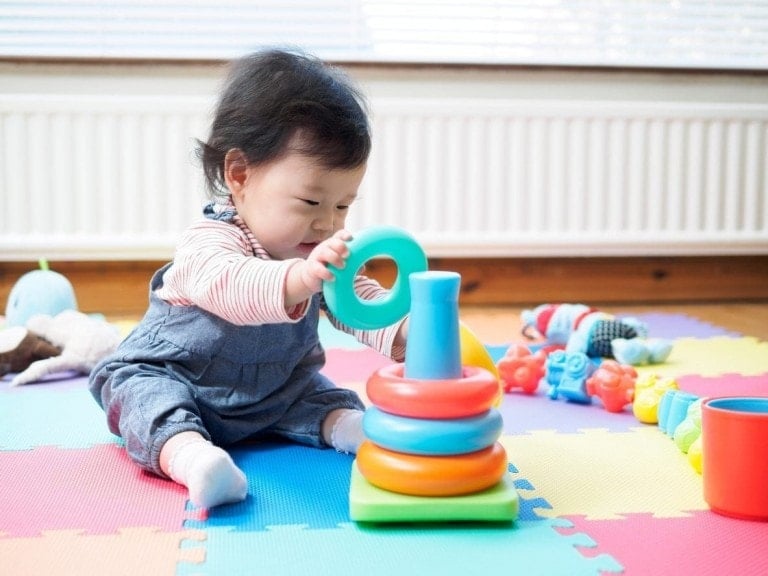It’s early in the morning, and my older toddler comes running into our bedroom, brown curls bouncing up and down, a big grin on her face. She throws herself on the bed and climbs on top of me, sometimes with a cache of toys, stuffed animals, or dolls. She happily exclaims, “Sun’s up, mommy! Sun’s up!” It’s a typical morning, and my toddlers—a one-year-old and an almost-three-year-old—are awake and chattering at dawn. I wish I could share in her early morning joy. But I am one tired mom and not in the I-stayed-up-too-late sense of the term. I have mommy burnout, like many other tired moms, and it’s starting to show.
Self-Care Is Great, but Sometimes It’s Not Enough
If you are a mama who feels exhausted or depleted, please know you are not alone in your experience. Many of us have known for a while that self-care is important. Many of us have taken measures to try to continue what self-care we can muster these days. At this point, though, self-care may not be enough anymore. If you feel burnt out to the point that self-care is insufficient, you may need to explore some lifestyle changes that may help you get the rest you need. I want you to have hope that it can get better!
When Self-Care Falls Short: 5 Lifestyle Adjustments to Consider
I’m sharing some ways I’ve gone beyond self-care. These lifestyle adjustments have helped me regain my energy and take back some of my physical and emotional strength.
1. Lower Your Expectations
Moms are tired, partly because we expect so much of ourselves and our family. Sometimes, the best way to give yourself rest is to lower those expectations. Stop trying to do as much as you used to or with the same intensity you used to do. You can’t do that unless you lower your expectations for yourself and your family and see that this is actually a good thing.
I’ve improved my energy level and decreased my tiredness by lowering my expectations for myself and those around me. Honestly, this has been the hardest thing I’ve done all year. I have a type-A, sometimes over-achiever personality, so asking me not to accomplish the things I want to achieve is a challenge.
But through many conversations with friends and mentors, I have realized that expecting less of my family and myself is healthy for us. It doesn’t mean I don’t have to-do lists or set goals. It means those lists and goals are less ambitious and less stressful. I can be more flexible, even grateful and positive if the winds change direction and I have to modify the schedule for our day.
This also means I’m not as tired anymore. I’m not forcing myself to accomplish things that, while they used to be easy, are now much harder. I’m learning to let go. It has resulted in happier children, a more relaxed mother, and a more peaceful household.
Action Step:
Talk to your people, including your husband, friends, mentors, or a woman’s support group, about your intentions to lower expectations and do less. Ask for practical ideas they may have. Surround yourself with people who give you space and encouragement to be kind and gentle with yourself. Consult with your partner and children and ask them to begin making the mental switch as well. This is an important step in switching to a more calm household.
2. Join A Support Group
A support group can look like anything from a group of friends meeting weekly on FaceTime to an online book club or a 12-step Recovery program that meets daily or weekly. Find a shared interest group that works for you. The important thing is that you feel safe and supported to share about yourself and your experiences. You might have to try a few meetings with that group to get a feel for it before deciding what works best for you.
Numerous communities and online gatherings will welcome you into their program, whatever that may be. I have found that having a sacred space where I feel safe to share about my life has been so important for my emotional rejuvenation and spiritual fulfillment. When I don’t connect with my group weekly, I tend to rely too heavily on my partner to emotionally meet my needs, which can become unhealthy for our marriage.
Regular human connection is essential to our physical and mental health.1 Cooperative interactions are ingrained in us; we are designed to connect and be with each other. Talking and videoing with like-minded people in support groups can help you work through your feelings of burnout and cultivate new ways of overcoming it.
Action Step:
Find a support group in your area or online. There are also groups on Facebook you can become a part of. Once you’ve joined a group, introduce yourself and start interacting! It may seem intimidating initially, but you must reach out to start making those all-important human connections. The other people in the group are probably just as nervous as you!
I participate in a twelve-step recovery program to maintain my emotional sobriety. It helps me stay emotionally balanced and healthy on a day-to-day basis. I partake in a weekly online meeting to support my mental health.
Through this program, I have gained a close-knit group of women I greatly trust and care about. We support, cheer each other on, and call and text each other during the week if we’re having a hard day. Or we call each other to celebrate when something is going well!
3. Ask For Help In Bold New Ways
Moms are tired because we don’t ask for help! Recently, I have had to ask for help in bold, new ways. I have had to ask for help with cleaning and childcare. I’ve had to ask for more sleep. I’ve had to hire a delivery person to do my grocery shopping.
Before now, I used to do it all by myself. I never got the help I probably needed all along. Why? Because I never asked for it. Getting over my pride and putting my mental health first has been the best thing I do for my family every week. When caring for myself, I can better care for my family.
Action Step:
What does asking for help look like for you? Maybe it means getting a counselor to help you sort through your thoughts and feelings, asking someone to care for your children so you can focus on your needs a few times a week, or requesting a delivery company to do your grocery shopping for you. What bold, new ways can you ask for help from your tribe?
For me, it means I’ve asked my husband to watch our kids on the weekend so that I can sleep more—whether that means sleeping in or taking a nap in the afternoon. And if he needs extra sleep, I reciprocate and give him space for extra sleep. It means I have someone watching my kids while my husband is at work (he’s essential) and I’m writing. Picking up the phone and asking people who can lend a hand has been instrumental in supporting my family and me and helping me get enough sleep.
4. Exercise
Research shows that when you work out, you gain more energy and feel less tired!2 Working out on a stationary bike, jogging on the treadmill, or taking a gym class is an excellent way to burn off stress and release those feel-good endorphins. Sometimes, I work out with one of my girlfriends or my husband. Or I make friends with people in my gym classes. Going to the gym is good for my physical health and allows me to be socially connected to others.
For some, getting out of the house is difficult, and they are unsure how to exercise. What I found was a wonderful online community for fitness workouts.
A California fitness trainer I follow on Instagram began offering free online classes twice a week. She has now built a following for her online classes, and I signed up to take them several times a week. They are short 30-45 minute workouts focusing on bodyweight workouts, which means you use your body to build and tone muscle. She also incorporates some HIIT workouts so that cardio is a part of the exercise routine. This is an easy way for any tired mom to incorporate that much-needed workout into her at-home routine!
Action Step:
There are many free online workout communities. Some require you to pay a monthly subscription, similar to a gym subscription. You can also find local classes from your local gyms, barre, and yoga studios. There are also online programs that offer accountability, mental health meetings, and a gym workout, offering a holistic approach to helping you maintain a healthy routine all week. Do a quick Google search and sign up for one today!
5. Hang in there, tired moms!
Moms are tired—so tired. We are burnt out. We carry the weight of the world on our shoulders. But you can do these and other things to incorporate more balance in your life—things beyond self-care, although it is still nice to indulge in self-care, too!
I’ve had a steep learning curve trying to regain balance. I’ve had to lower my expectations of myself and others. I am asking for help in bold new ways. Community support and exercise have been moved to the top of my priority list. All these have helped me become a more energized—and ultimately happier and healthier—mother to my children and partner to my husband.
You got this, Mama!











